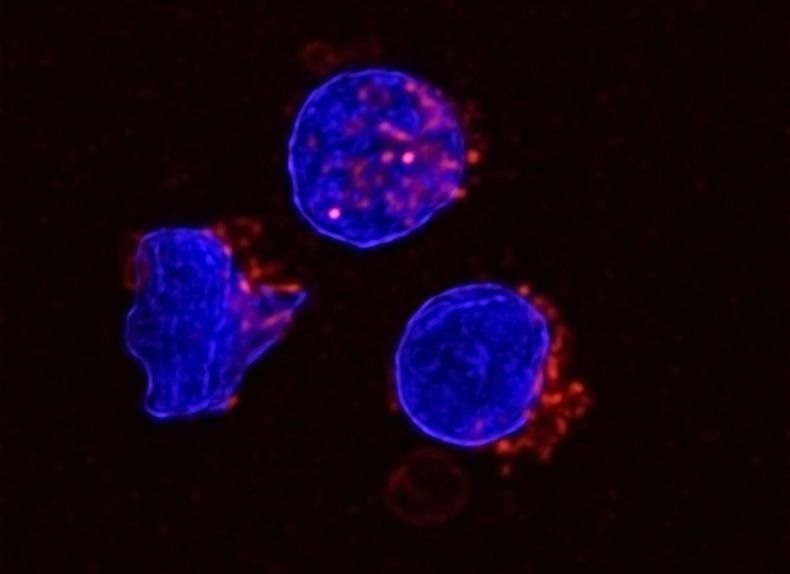Reviewed by Lexie CornerMay 12 2025
Recent research by scientists in Ireland has shown that lipid-rich fluid in the abdomen, known as ascites, plays a key role in weakening the body’s immune response in advanced ovarian cancer. These findings help explain how the immune system is suppressed in this type of cancer and may inform future immunotherapy approaches.
 Human NK cells have large nuclei stained in blue and droplets of fat stores stained in red. Image Credit: Dr. Karen Slattery, Trinity College Dublin
Human NK cells have large nuclei stained in blue and droplets of fat stores stained in red. Image Credit: Dr. Karen Slattery, Trinity College Dublin
More than 70 % of ovarian cancer patients are diagnosed at an advanced stage, often with large amounts of fluid in the abdomen, called ascites. This fluid not only helps the cancer spread within the abdominal area but also weakens the body’s immune response.
Understanding how ascites affects the immune system is important for developing better treatments that use the immune system to fight cancer.
In this study, researchers from Trinity College and University College Dublin investigated how ascites interferes with immune cells, particularly natural killer (NK) cells and T cells, which play a key role in eliminating tumors.
By examining the fluid from ovarian cancer patients, the team found that a group of fat molecules called phospholipids contributes to the reduced function of these immune cells.
Dr. Karen Slattery, a Research Fellow at the Trinity Translational Medicine Institute, is the lead author of the study, which was published in the journal Science Immunology.
We found that these lipids interfere with NK cell metabolism and suppress their ability to kill cancer cells. Crucially, we also discovered that blocking the uptake of these phospholipids into NK cells using a specific receptor blocker can restore their anti-tumour activity, which offers a compelling new target for therapeutic intervention.
Dr. Karen Slattery, Research Fellow and Study Lead Author, Trinity College Dublin
Slattery said, “This work adds a critical piece to the puzzle of why ovarian cancer is so aggressive and has such poor outcomes. While the immune system is naturally equipped to detect and destroy cancer cells, this function is switched off in many individuals with ovarian cancer, and we now know that this is in part due to the fat-rich environment created by ascites.”
This study marks a significant advancement in ovarian cancer research, identifying a new mechanism underpinning immune failure and laying the foundation for new therapies that could restore immune function in these patients. By targeting the fat-induced suppression of immune cells, future treatments could empower the body’s own immune defences to fight back and, in doing so, improve outcomes for ovarian cancer patients.
Lydia Lynch, Professor and Study Senior Author, Princeton University
Source:
Journal reference:
Slattery, K., et al. (2025) Uptake of lipids from ascites drives NK cell metabolic dysfunction in ovarian cancer. Science Immunology. doi.org/10.1126/sciimmunol.adr4795.